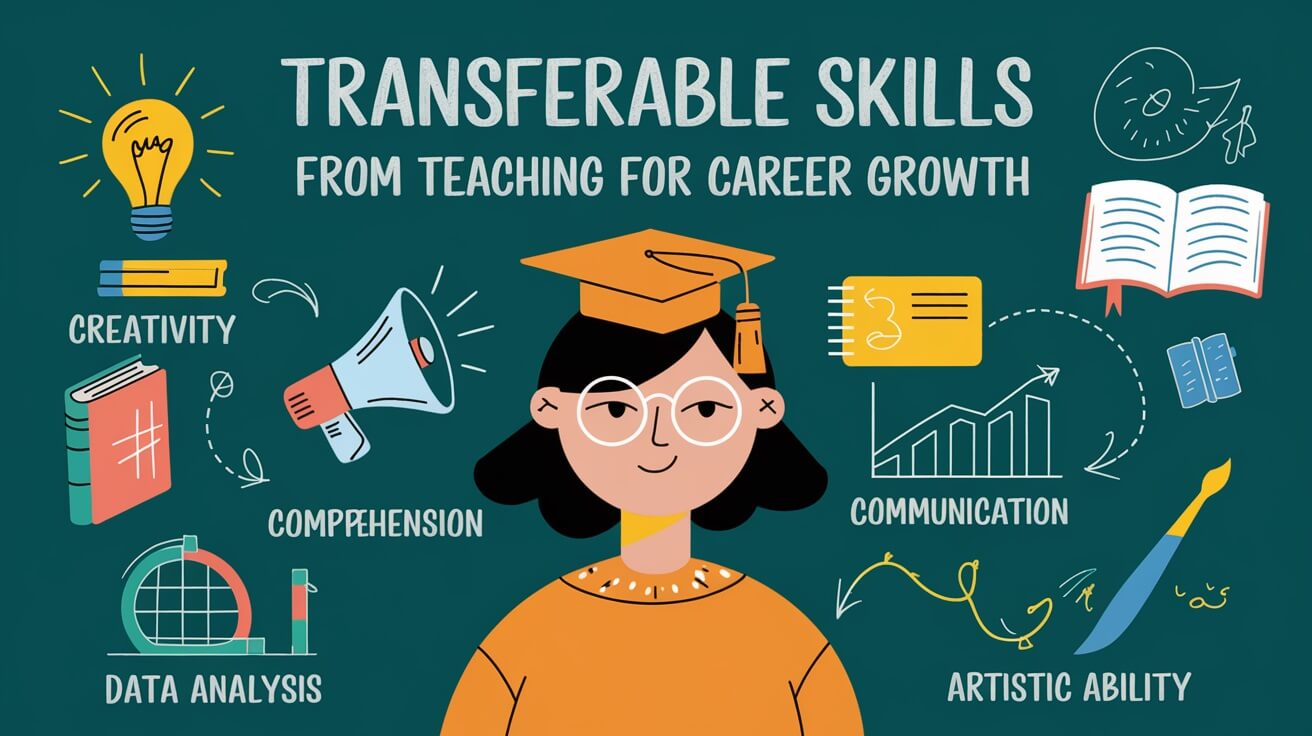
Transferable Skills from Teaching for Career Growth
Have you ever felt your teaching career might be holding you back from exploring other opportunities? If so, you're not alone. Many teachers feel uncertain about their options outside the classroom, often underestimating how valuable their skills are in other industries.
Teaching isn't just about delivering lessons; it's about managing people, solving problems, and inspiring growth—all traits in high demand across numerous professions.
This article will delve into the transferable skills you've gained from teaching and how they can open doors to exciting new career paths. We'll provide actionable tips, share success stories, and help you build confidence in your abilities.
What Are Transferable Skills?
Transferable skills are the abilities you've developed that can be used effectively in various roles and industries. They're your professional toolkit, adaptable to any situation or job.
Key Examples
-
Communication: Articulating ideas clearly and effectively.
-
Problem-solving: Finding creative solutions under pressure.
-
Organization: Managing multiple priorities efficiently.
-
Leadership: Guiding and motivating teams or individuals.
Why They Matter
Employers often prioritize transferable skills over direct experience. For example, a CareerBuilder survey shows that 73% of hiring managers value transferable skills over job-specific qualifications. As a teacher, you already possess a unique skill set applicable to various fields.
Why Teaching Develops Transferable Skills
Teaching is a profession that inherently builds a wide array of skills. Let's explore why:
Core Competencies Gained from Teaching
-
Public Speaking: Regularly presenting information in a way that captivates and educates.
-
Conflict Resolution: Managing disputes between students or colleagues with diplomacy.
-
Time Management: Juggling lesson planning, grading, and extracurricular commitments.
How These Skills Translate
Your ability to lead a classroom mirrors the leadership required in managerial roles. Your knack for explaining complex topics translates directly into training and development roles. By recognizing these parallels, you'll see just how valuable your teaching experience is.
Essential Transferable Skills from Teaching

Teaching isn't just about delivering lessons—it's about managing people, inspiring growth, solving problems, and keeping everything organized. These skills surpass classroom boundaries and hold value across numerous industries. Here are seven key transferable skills teachers develop that are highly valued in other professions:
1. Communication and Presentation Skills
Clear and effective communication is a central aspect of teaching. Whether you're explaining complex concepts to students or presenting information to colleagues, teachers are masters at tailoring their message to their audience. This ability to simplify and articulate ideas is crucial in corporate training, public relations, and sales.
-
Why It's Valuable: Many industries need professionals who can convey ideas clearly, whether pitching a product, training employees or delivering presentations to stakeholders.
-
Example: As a teacher, you've already practiced public speaking daily, engaging diverse audiences. This experience translates seamlessly into roles like corporate trainers, where clear communication is essential for success.
2. Leadership and Management
Teachers naturally take on leadership roles. Whether managing a classroom, mentoring students, or collaborating with colleagues, educators lead by example and inspire others to perform at their best. These qualities align closely with human resources, project management, and team leadership roles.
-
Why It's Valuable: Leadership is about guiding others to achieve a shared goal. Teachers already have experience setting objectives and motivating groups to meet them.
-
Example: A teacher managing a classroom of 30 students resembles a project manager overseeing a team. Both roles require delegation, conflict resolution, and accountability.
3. Adaptability and Problem-Solving
No two days in a classroom are the same. From handling unexpected disruptions to adjusting lesson plans on the fly, teachers are experts at thinking on their feet. These skills are highly valued in fast-paced industries like customer service, technology, and event management.
-
Why It's Valuable: In fast-paced workplaces, quickly adapting and finding creative solutions can often determine success or failure.
-
Example: A teacher adapting to a last-minute schedule change is similar to a customer service representative resolving an unexpected client complaint. Both require quick thinking and effective decision-making.
4. Emotional Intelligence
Self-awareness, empathy, and the ability to form meaningful connections are fundamental components of emotional intelligence—qualities teachers exhibit daily. Educators often manage diverse personalities, address emotional needs, and foster positive relationships. These skills are invaluable in counseling, human resources, and customer relations.
-
Why It's Valuable: Emotional intelligence enhances teamwork, improves customer satisfaction, and fosters better workplace relationships.
-
Example: A teacher managing a student's behavioral challenges parallels an HR professional resolving workplace conflicts. Both scenarios demand Empathy, understanding, and effective communication.
5. Organization and Time Management
Teachers juggle numerous responsibilities, from planning lessons and grading assignments to managing extracurricular activities. Maintaining organization and adhering to deadlines is essential in event planning, project management, and administrative coordination.
-
Why It's Valuable: Employers value individuals who can prioritize tasks, manage time effectively, and maintain productivity under pressure.
-
Example: A teacher balancing lesson preparation with student evaluations is similar to an event planner coordinating multiple vendors for a seamless event.
6. Collaboration and Teamwork
Teaching isn't a solo endeavor. Teachers regularly collaborate with colleagues, parents, and administrators to achieve common goals. This ability to work effectively in a team is essential in industries like marketing, consulting, and healthcare.
-
Why It's Valuable: Teamwork fosters creativity, ensures efficiency, and drives better results in collaborative projects.
-
Example: A teacher working with parents and school counselors to support a student's learning needs mirrors a marketing professional collaborating with designers and copywriters to launch a campaign.
7. Creativity and Innovation
Creativity is a cornerstone of effective teaching. Educators constantly develop innovative ways to engage students, explain concepts, and solve challenges. This ability is highly valued in advertising, product development, and educational technology (EdTech).
-
Why It's Valuable: In a competitive marketplace, creativity drives innovation, helping companies stand out and adapt to changing needs.
-
Example: A teacher designing interactive lesson plans demonstrates the same creative problem-solving required to develop a new marketing strategy or create a user-friendly app.
Why These Skills Matter
These seven skills—communication, leadership, adaptability, emotional intelligence, organization, collaboration, and creativity—aren't just qualities teachers develop; they're professional assets that open doors to countless opportunities. Recognizing and showcasing these abilities will help you transition into roles where your teacher experience is relevant and highly valued.
By leveraging these transferable skills, teachers can confidently explore new industries, knowing that their expertise is adaptable and indispensable.
Industries and Roles That Value Teaching Skills
1. Corporate Training and Development
-
Designing and delivering training programs for employees.
-
Coaching and mentoring new hires.
2. Human Resources
-
Resolving workplace conflicts.
-
Managing recruitment and onboarding processes.
3. Customer Service and Client Relations
-
Using communication and Empathy to improve client satisfaction.
4. Education Technology (EdTech)
-
We are developing online learning tools or courses.
-
We are collaborating with teams to improve educational platforms.
5. Nonprofit and Community Work
-
Leading outreach programs.
-
We are advocating for community initiatives.
Actionable Steps to Highlight Your Transferable Skills
1. Build a Skills Checklist
Identify your core skills, including communication, leadership, and adaptability, and align them with the requirements outlined in job descriptions for your target industry.
2. Tailor Your Resume and Cover Letter
Reframe your teaching experience using action-oriented language. For example:
-
Before: "Taught a class of 30 students."
-
After: "Facilitated learning for a diverse group of 30 individuals, achieving measurable performance improvements."
3. Prepare for Interviews
Use the STAR method (Situation, Task, Action, Result) to present your teaching achievements in a way that resonates with hiring managers.
Real-Life Examples of Career Transitions from Teaching
Success Story #1: From Classroom to Corporate Trainer
After 10 years as a high school teacher, Sarah transitioned into a corporate training role, where she designs workshops for new employees. Her ability to simplify complex ideas and connect with audiences made her a natural fit.
Success Story #2: A Teacher Turned HR Specialist
John leveraged his classroom management skills to excel in human resources, where he now leads team-building initiatives and conflict-resolution workshops.
Overcoming Challenges in Career Transitions
1. Addressing Self-Doubt
It's normal to question whether your skills are relevant. Start by reflecting on your accomplishments and the impact you've had as a teacher.
2. Upskilling
To bridge any gaps, consider short courses or certifications in areas like project management, digital tools, or public speaking.
3. Networking
Connect with professionals in your target field through LinkedIn or industry events. Many successful transitions happen through referrals.
Key Takeaways
-
Your teaching skills are far more versatile than you might think.
-
Industries like HR, EdTech, and corporate training value your honed abilities.
-
Start today by identifying your transferable skills, tailoring your resume, and exploring new opportunities.
FAQs
What are transferable skills from teaching?
They include communication, leadership, organization, and problem-solving skills that apply to other roles.
How do I identify my transferable skills?
Reflect on your daily tasks and achievements as a teacher, then match them to industry needs.
What industries value teaching experience?
Corporate training, EdTech, HR, customer service, and nonprofit organizations.
How can I upskill for a new career?
Take online courses, attend workshops, or gain certifications in your desired field.
What's the first step to transitioning out of teaching?
Start by creating a transferable skills checklist and researching industries that align with your interests.
Conclusion
Your teaching career has given you many highly sought-after skills in other industries. By recognizing your strengths, framing your experience effectively, and taking proactive steps, you can open the door to new and exciting opportunities. The possibilities are endless—start exploring them today!


